Online Catalog
Sarracenia SPECIES
This genus was named in honor of Dr. Sarrazin by the botanist Tournefort. Pitcher plants are our favorite because of their large, showy, and colorful flowers and leaves. Insects fall or get caught in the recesses of the funnel shaped traps and are used by the plants as a source of nutrients for growth. Easily grown outside in a bog garden in full sun they are always a topic of conversation while the flowers and leaves can be dried to make attractive arrangements.
We offer both species and hybrids. Although there are a variety of mechanisms for maintaining the identity of the various species, occasionally they cross in the wild and produce offspring. Large natural hybrid swarms are known to exist but usually hybrids occur as scattered individuals in disturbed habitats. We encourage you to try growing the species as well as the hybrids.
Wholesale/Bulk rates: See below for bulk pricing on select items.
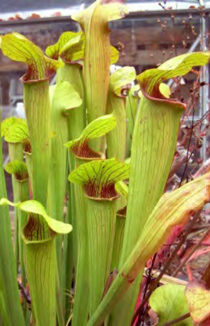
|
Sarracenia alata
The Texas trumpet!! This is the only pitcher plant species found west of the Mississippi with most of the range in Louisiana and Texas. The species is winter hardy in the mid-Atlantic states and produces attractive, faintly lemon-scented, cream to yellow flowers in May. Leaves are a golden yellow with subtle reddish-purple veining inside the pitcher. Especially attractive in large clumps. |
|
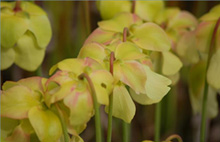
|
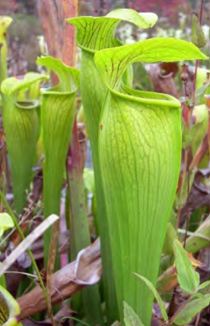
|
Sarracenia alata "areolata‟
Within the Texas and Louisiana populations of S. alata rare individuals possess faint windows similar to those found in S. alabamensis. Although the windows are not the same as in S. leucophylla, they may reflect an evolutionary trend within the genus Sarracenia to develop light patches for insect captures. |
|
|
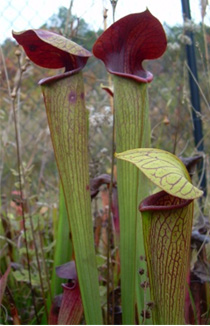 |
Sarracenia alata "Purple helmet"
An interesting cultivar characterized by intense purple under the hood. |
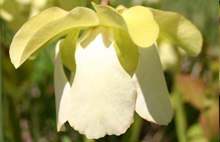
Out of stock
|
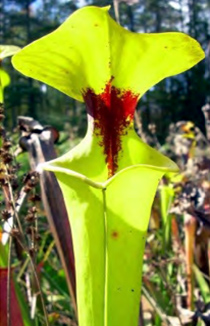 |
Sarracenia flava var. rugellii
Characterized by distinctive purple blotch restricted to the throat. |
|
|
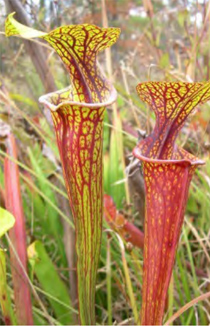 |
Sarracenia flava var. ornata
Reddish purple pigmentation radiates throughout the veins of the plant. |
|
|
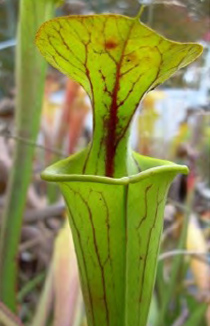 |
Sarracenia flava var. flava
|
|
|
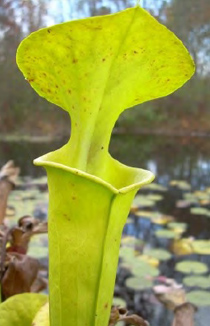 |
Sarracenia flava var. maxima |
|
|
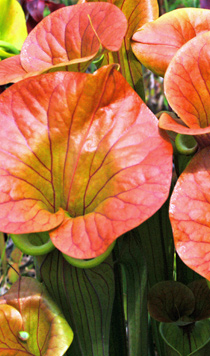 |
Sarracenia flava var. cuprea "Coppertop"
The top of the pitcher is a coppery-tan color with reddish-purple veining inside the pitcher. The copper coloring on the lid is a transient feature and disappears as the pitcher ages.
|
|
|
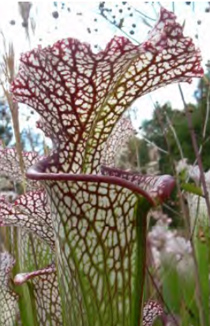 |
Sarracenia leucophylla
The White-topped Pitcher Plant. This stunning pitcher plant has ma-roon flowers, and leaves that are laced with small white flecks over the upper portion of the pitcher. Leaves may be dried in sand and then sprayed with a floral sealer for exquisite displays. |
|
|
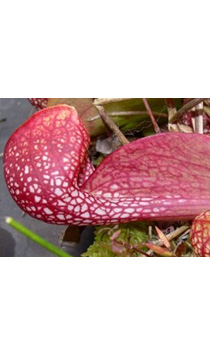 |
Sarracenia psittacina
The Parrot Pitcher Plant. The hood of this decumbent pitcher plant has a vague similarity to a parrot’s beak. Although we don’t recommend Sarracenia for indoor culture, this low growing species is best suited to the confined conditions of a terrarium. In addition, this southern species is frost sensitive and may survive several years in a terrarium with minimum dormancy.
|
|
|
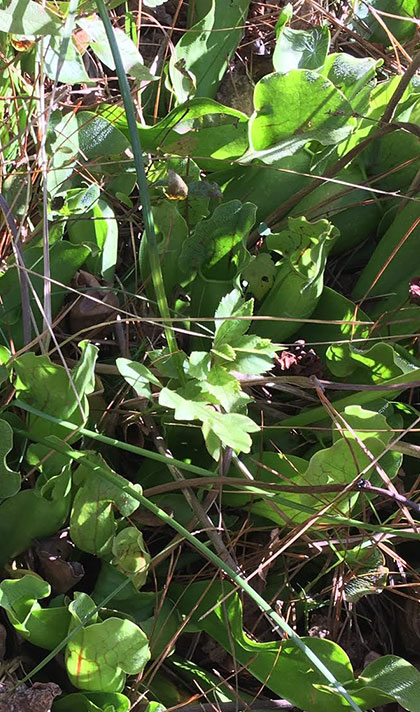
|
Sarracenia purpurea var. montana (mountain form)
mountain form of S. purpurea only found in the mountains of North and South Carolina and Georgia. Our plants are seed raised from a North Carolina population and have a bit of variation in pitcher form from the classic var. montana.
|
|
Out of stock
|
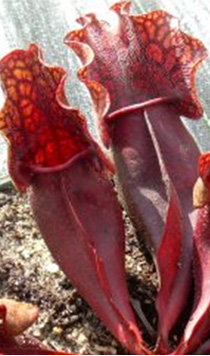 |
Sarracenia purpurea
We have decided to accept one taxon, S. purpurea, instead of splitting this entity into two subspecies (ssp. purpurea and venosa). There are sound morphological and genetic reasons for this decision. We agree there are differences between populations and as a result will now offer S. purpurea with location specific identity so that you can draw your own conclusions on the subspecies question. Our first offering is from the mid-Atlantic stock. Leaves are characterized by beautiful purple veining and semi-deciduous leaves. Flowers are maroon. |
|
|
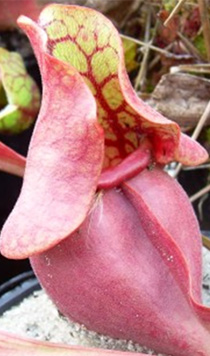 |
Sarracenia rosea
Burke‘s Southern Pitcher Plant. Attractive pink flowers and best grown in the southern states. Leaves tend to be deciduous in colder climates.
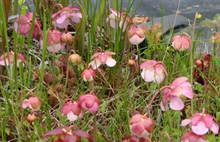
|
|
|
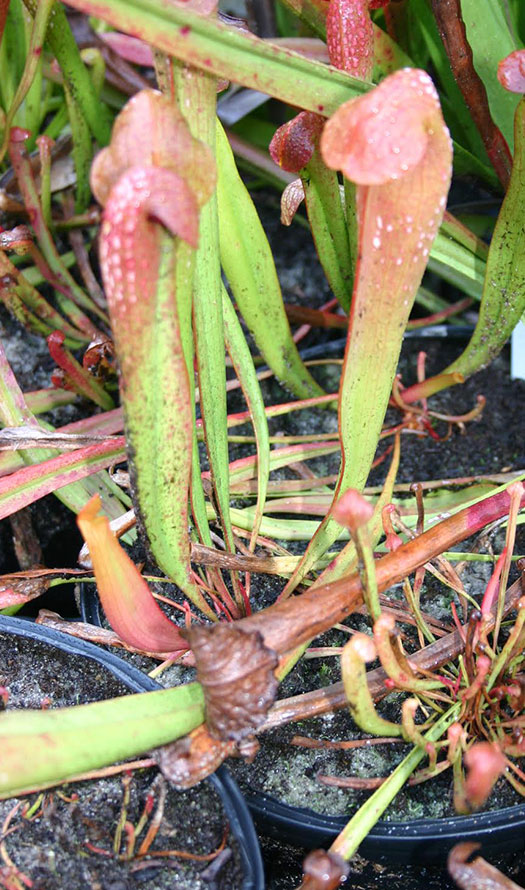
|
Sarracenia minor
Hooded pitcher plant |
|
|
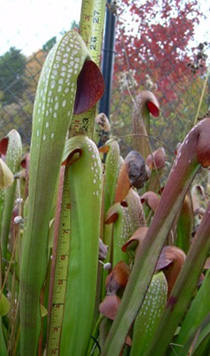 |
Sarracenia minor var. okeefenokeensis
This huge pitcher plant is found growing on floating mats within the Okeefenokee Swamp. Pitchers can be 2-3 feet tall. |
|
|
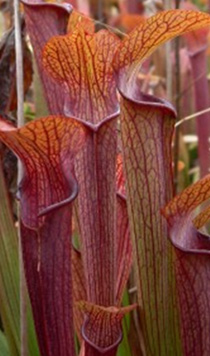 |
Georgia Fall line sandhills
We think this is an un-described subspecies that is ancestral to ssp. gulfensis. Lightly pubescent, reddish pitchers with arching hood
|
|
|
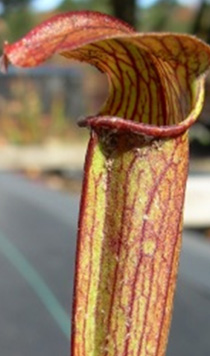 |
ssp. rubra - Carolina coastal plain
Reddish-tan, linear pitchers. |
|
|
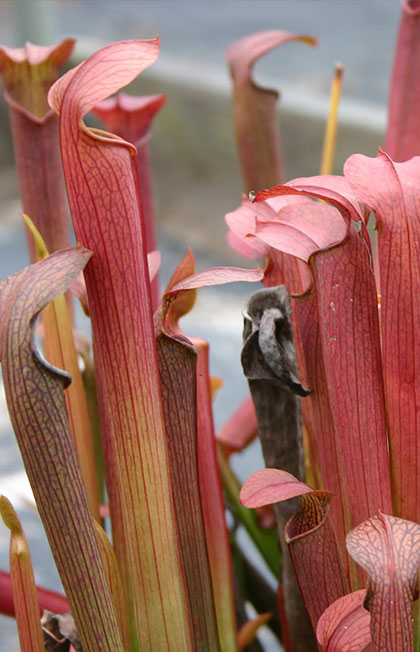 |
ssp. gulfensis
Tall, stately, red pitchers.
|
|
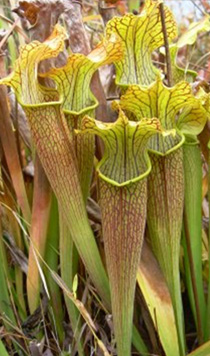 |
Sarracenia alabamesis ssp. wherryi
Golden yellow pitchers with arching hood. |
|
|
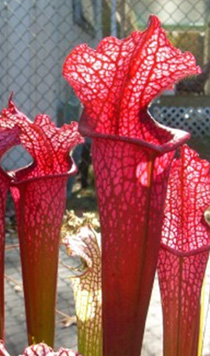
|
Sarracenia leucophylla "Burgundy"
A striking backcross of S. leucophylla and S. rosea.
|
|
|
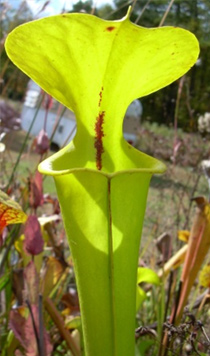
|
Sarracenia flava "Fadeout"
This form of S. flava is basically var. rugellii with a faded-out throat splotch, hence the name. The splotch never develops more than a thin purple line. An outstanding feature of this cultivar is the persistent honey fragrance produced by the pitcher leaves.
|
|
|
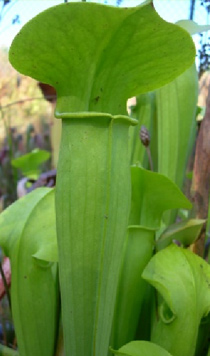
|
Sarracenia alata "Veinless"
A remarkable variant of S. alata that has no purple in leaf veins.
Price Reduced!
|
|
|





























